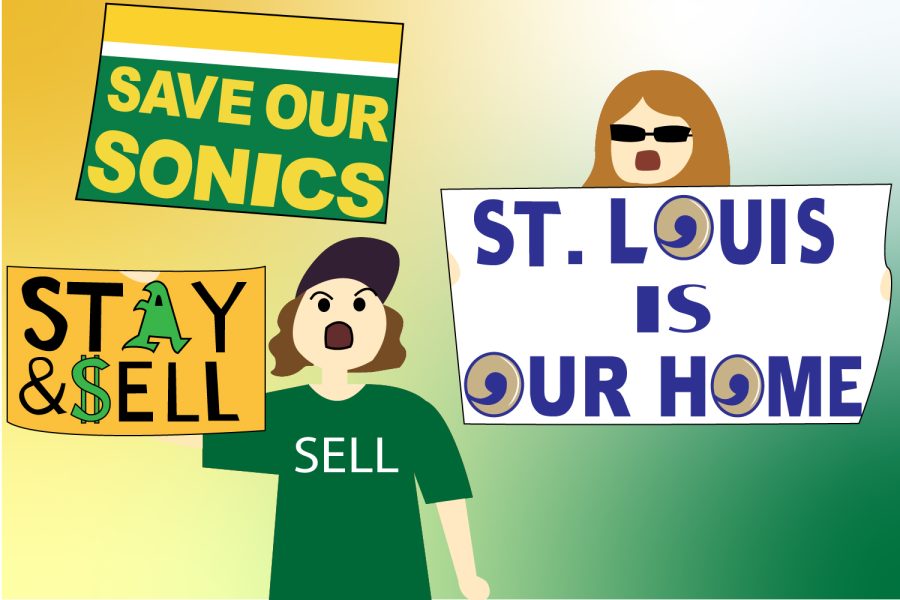The plight of Oakland A’s fans is all too familiar
27,700 A’s fans stage “reverse boycott”, Team ownership tactics resemble Sonics, prior relocation attemps
The Oakland Athletics relocation mirrors prior relocations of the Seattle SuperSonics, Rams and Raiders.
June 18, 2023
With the Oakland Athletics’ relocation to Las Vegas growing more likely by the day, A’s fans did the only thing they know how to do, root for their team in the Oakland Coliseum, Tuesday night.
It was a magical night on the field as the A’s beat the Tampa Bay Rays, the best team in baseball, 2-1 for their MLB-best seventh consecutive win.
But the festivities in the stands and in the parking lot were far more impressive considering the circumstances.
The fan-organized ‘reverse boycott’ saw 27,759 disillusioned A’s fans have their voices heard and featured 7,000 green shirts with “SELL” printed in bold white text, hundreds of entertaining signs, and coordinated chants, including “Sell the Team” and “Stay in Oakland.”
It was a beautiful demonstration of love for a team that means so much to a city, region and fanbase. The fans that threw trash onto the field after the game should be ashamed of themselves though.
The Athletics, similar to a number of franchises, have moved before. Founded as the Philadelphia Athletics in 1901, the team moved to Kansas City in 1955 and Oakland in 1968. Philly and KC have gained major league franchises of their own since losing the A’s while the prospect of Major League Baseball returning to the East Bay seems bleak.
The A’s relocation is playing out as a number of relocations have over the years.
A dissatisfied owner alienates fans by trading star players, tanking the team and raising ticket prices. They make a ridiculous request for public funding to build a state-of-the-art venue to replace an existing insufficient venue knowing that the local and state governments are ill-prepared to satisfy their demands.
With the support of their respective league, they say that their hands are tied and take a similarly ridiculous request to another city hungry for a team. They receive their public funding, resolve any suits or leases in their old home by throwing money at the issue and get out of town.
Fisher and company have virtually followed this playbook to a “T.”
In 2019, the A’s won 97 games and made the playoffs with an All-Star-laden roster that included Marcus Semien, Matt Chapman, Matt Olson, Sean Murphy, Mark Canha and Liam Hendriks.
They finished second in the AL West behind World Series Champion Houston Astros and lost to the Rays in the AL Wild Card Round.
The A’s core was impeccable and they finally had the ownership with a pocketbook big enough to keep the band together and legitimately contend for a World Series.
They had the chance to shed their “Moneyball” reputation as a small market team that often struggled to pay their biggest stars but found a unique, new-age analytical way to win which led them to the brink of the World Series in 2002 with baseball’s smallest payroll. The story of that season has been told by Michael Lewis in his book “Moneyball: The Art of Winning an Unfair Game” and cemented in popular culture by the 2011 film”Moneyball”.
It’s a great story but is something that fans believe led A’s ownership to cling to the “don’t spend money on players part” rather than the “still win” part over the next two decades as teams figured out the Athletics’ approach and Oakland missed the playoffs year after year.
However, Fisher’s dismantling of a contender effectively alienated the fanbase and sent an alarming message that the A’s were unhappy with their situation in Oakland.
It is no secret that the Oakland Coliseum is one of, if not the worst, active venues in professional sports, but there is a certain charm to it that five decades-worth of summers provide.
Mayor Sheng Thao told ESPN the city was “days away” from agreeing to a $12 to 18 billion waterfront ballpark at the Howard Terminal on the Oakland waterfront when in April, Fisher informed her that the team had purchased land in Las Vegas.
On Tuesday, the Nevada Senate approved Fisher’s $380 million request for public funding to assist the $1.5 billion stadium project in Las Vegas. The assembly and governor approved it later in the week.
Later that day, Oakland A’s fans showed up to the Coliseum parking lot for their previously organized reverse boycott, feeling even more motivated to proclaim their love for their team.
Relocation is the nastiest part of professional sports, which whether we like it or not is a business.
But, it is a business that relies on a customer base that truly cares about the team. This care is often generational.
People grow up at the ballpark, in the arena or at the stadium. They wear team colors to picture day. They skip school to attend opening day. They grow to spend hours watching, listening, reading, talking and in short, caring about the team.
When you walk into your favorite team’s stadium, you feel at home. You feel like you are a part of something, like you and the team matter.
Owners capitalize on this intangible feeling of belonging but they do not respect it when a more lucrative business prospect presents itself.
Oakland fans are used to this. Mark Davis left Oakland in the dust when he successfully moved the Raiders to Las Vegas and even the Golden State Warriors left neighboring Oracle Arena for a shinier venue across the bay in San Francisco.
For Seattle sports fans, this feeling is all too familiar.
The NBA’s Seattle SuperSonics fell victim to this very pattern of deceit when owner and Starbucks CEO Howard Schultz sold the team to Clay Bennet and a group of Oklahoma City businessmen. OKC had been the temporary home for the New Orleans Hornets after their arena was damaged during Hurricane Katrina and it was no secret that the city was hungry for an NBA team.
Their attempts to keep the team in Seattle were empty actions intended to check a legal box of making a “good faith effort.”
The Washington legislature within the previous decade had exhausted public funding in the construction of two professional sports venues (now T-Mobile Park, home of the MLB’s Mariners and Lumen Field, home of the NFL’s Seahawks and soccer clubs Sounders FC and Reign FC) when the Mariners and Seahawks were threatened by relocation.
The legislature was unamused by a ridiculous request of public funding for yet another private sports venue, leaving Bennet and company, with the backing of then NBA commissioner David Stern, free to jack up the ticket prices and tank so the team would be contenders in time for relocation.
In a matter of two years from the sale of the team, the Seattle SuperSonics, after 41 years in the Emerald City, became the Oklahoma City Thunder in 2008. Despite a Super Bowl victory, Mariners’ resurgence, multiple WNBA titles and successful soccer and hockey expansion teams, Seattle has just not been the same since.
Thankfully, there is a light at the end of the tunnel with a state-of-the-art Climate Pledge Arena hosting the NHL’s Seattle Kraken and WNBA’s Seattle Storm and the NBA considering expansion soon, but that is another story.
Just like how Stern allied with Sonics owners to relocate the team to OKC because the state of Washington refused to give a billion-dollar industry millions of taxpayer dollars, so too has MLB Commissioner Rob Manfred allied with Fisher to expedite the A’s relocation to Vegas.
This is, of course, a demonstration of everything that is wrong with professional sports. Fans, who adore the team and invest a ton of time and money over generations, do not deserve to have their team stolen from them.
There is very little hope for the A’s staying in Oakland, but on Tuesday, that did not stop A’s fans from telling team and MLB leadership exactly how they feel.
The A’s belong in Oakland. And baseball is better for it.










